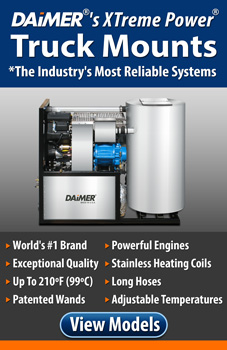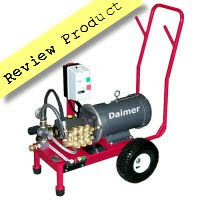
Electric pressure washers derive their power from electricity. Although they can be heated by electricity as well, many still require the use of fuel such as diesel, gasoline, or propane to heat the water. Because of this, many people may become confused as to which machine is best for their needs. The following are a few tips on how to select electric pressure washers.
Pressure Levels and Temperature
Electric powered machines can produce both cold water and hot water output up to 210°F. Pressure levels can reach up to 2175 psi. Output pressure and temperature are two important specifications to look for when purchasing electric pressure washers. If not taken into careful consideration, higher pressure levels can damage certain surfaces. In many instances, high pressure levels and temperature settings may not even be needed for cleaning. When this happens, green cleaning chemicals, such as Daimer®’s Eco-Green® series of cleaning solutions, can be used to boost cleaning power.
When to Select Electric Pressure Washers
Electric pressure washers have many advantages. For example, they produce no exhaust fumes like fuel-powered machines and they offer a much quieter operation. These features make them excellent machines for indoor cleaning. However, if there are electrical outlets or a generator nearby outdoors, electric machines can be used for exterior cleaning as well.
Machines heated by fuel have the additional option of including steam output. This temperature reaches up to 329°F. There are also many tri-mode machines, which offer cold water, hot water, and steam output. If the machine will be constantly transported to different areas and there is no guarantee of an electrical outlet being present, fuel powered machines may be the best option. Daimer® also offers machines with Long Hose Technology, allowing the operator to reach places up to 300 feet away by using long hoses. This means the fuel powered machine can be left outside, while the cleaning is done indoors.
Pressure Levels and Temperature
Electric powered machines can produce both cold water and hot water output up to 210°F. Pressure levels can reach up to 2175 psi. Output pressure and temperature are two important specifications to look for when purchasing electric pressure washers. If not taken into careful consideration, higher pressure levels can damage certain surfaces. In many instances, high pressure levels and temperature settings may not even be needed for cleaning. When this happens, green cleaning chemicals, such as Daimer®’s Eco-Green® series of cleaning solutions, can be used to boost cleaning power.
When to Select Electric Pressure Washers
Electric pressure washers have many advantages. For example, they produce no exhaust fumes like fuel-powered machines and they offer a much quieter operation. These features make them excellent machines for indoor cleaning. However, if there are electrical outlets or a generator nearby outdoors, electric machines can be used for exterior cleaning as well.
Machines heated by fuel have the additional option of including steam output. This temperature reaches up to 329°F. There are also many tri-mode machines, which offer cold water, hot water, and steam output. If the machine will be constantly transported to different areas and there is no guarantee of an electrical outlet being present, fuel powered machines may be the best option. Daimer® also offers machines with Long Hose Technology, allowing the operator to reach places up to 300 feet away by using long hoses. This means the fuel powered machine can be left outside, while the cleaning is done indoors.
























